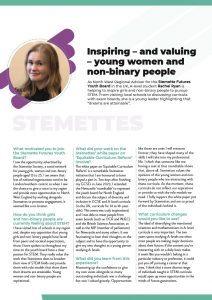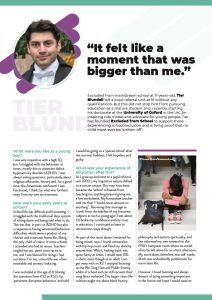“It felt like a moment that was bigger than me.”
Excluded from mainstream school at 11-years-old, Tier Blundell left a pupil referral unit at 16 without any qualifications. But this did not stop him from pursuing education as a mature student and, recently, starting his doctorate at the University of Oxford in the UK. An inspiring role model and advocate for young people, Tier has founded Excluded from School to support those experiencing school exclusion and is living proof that no child must ever be ‘written off’.
What were you like as a young boy?
I was very inquisitive with a high IQ, but I struggled with my behaviour at times, mostly due to attention deficit hyperactivity disorder (ADHD). I was always asking questions, particularly about religious education, history and, for a good time, the Amazonian rainforest! I was fascinated, I think, by what was furthest away from my own environment.
How were your early years at school?
School life was difficult and frustrating. I struggled with the traditional class system of sitting down and being told what to do. This was due, in part, to ADHD but also a response to having emotional behaviour difficulties which were a product of my chaotic and traumatic home life. Being the only child of colour in some schools I attended also had its issues. Teachers singled me out, peers were racist to me, and I was blamed for things I had not done. For me, school life was often miserable and anxiety-inducing.
I was excluded at the age of 11 (during the transition from KS2 to KS3), for ‘persistent disruptive behaviour’ and told I would be going to a ‘special school’ after the summer holidays. I felt hopeless and guilty.
What was your experience of education after this?
As I grew up and went to a pupil referral unit (PRU), my inquisitive nature shifted to a certain extent. This may have been because the ‘school’ refrained from teaching me anything beyond giving me a few worksheets. My humanities teacher told me that I “would never amount to anything”. Receiving that message as ‘truth’ from the teacher of my favourite subjects at such a young age (I was about 13) broke my confidence and my trust in education. I continued to learn in unconscious ways though.
As part of the racist abuse I received for being mixed-race, I found connection with hip hop music and fixed my identity around that. Which, looking back, was quite funny at times. I would wear XXL t-shirts, even though as an adult I can get away with an XS! I enjoyed listening to the Wu-Tang Clan and Public Enemy whilst at school and can still recount their song lyrics verbatim! This larger-than-life culture taught me about black history, philosophy and eastern spirituality, and this informed my own research in the PRU’s computer room where we would often be left alone for an entire afternoon. My curriculum, therefore, was self-made, which was undoubtedly problematic for me in later life.
However, I loved learning and always dreamt of doing something important in the future and knew I would need an education to do so. Whilst at my PRU, I advocated for myself to return to mainstream school, resolute that I would drop my behavioural tendencies and focus on studying. I managed to get myself back in for some classes until, sadly, the school decided it would no longer accept students from the PRU. ‘Excluded’ once again, it was hard to see others on their way to school wearing the uniform – a strange envy. I left the PRU with no qualifications and having not studied some subjects, like science, since my mainstream school in year 6.
What impact did moving to the PRU have on you?
It meant I had to toughen up, quickly. The other kids there had significantly more social challenges than I had; many struggled with drug use. I had to fight to survive. If someone bullied me, I learnt that if I fought back, I would probably get hurt, but I would earn their respect and reduce the chances of being bullied again. Toughness was the currency of the day, and, in many ways, I think that impact helped me throughout my life.
A more practical impact was that I left without any qualifications. Despite being given an opportunity to undertake an access course, which got me into the University of Warwick, followed by St Andrews University and, currently, the University of Oxford, I still do not have a GCSE in Maths and am, therefore, excluded from becoming a qualified teacher! Spiritually though, my experience filled me with resolve, and I am very privileged to have been able to mould that resolve into advocating for other young people who either have been or at risk of being excluded from school.
What motivated you to pursue education as a mature student?
It was a mixture of factors. I had enjoyed learning martial arts and travelling through different cultures. During this journey, I became interested in moving to Canada but realised I was ‘unskilled’ and lacked any qualifications that would fulfil the entry requirement. I was also working as a doorman at bars and clubs in Leicester and enjoyed having conversations with the customers, who were mainly students from the city’s two universities. Student life looked like fun, and I thought “I want a bit of that!” When I started my access course, I caught the bug. I absolutely loved classroom discussion and going to the canteen afterwards with fellow students and continuing the conversation. I was finally surrounded by teachers who respected me and peers who wanted to learn; I was in my element and knew university was for me.
What challenges did you face when you re-entered education?
The biggest challenge was the deficit of education that I still held. I had no knowledge of grammar at all; I found writing essays easy conceptually but incredibly difficult when it came to prose and structure. I got myself a private tutor to teach me grammar and, as a result, I saw my grades increase, ultimately attaining a first-class degree.
How did it feel to gain your PhD place at the University of Oxford?
It felt like a moment that was bigger than me. I had proven that excluded children should not be written off academically. It is rare that an excluded child will get a pass in English or Maths – less than 2% –, let alone go on to university. However, this is a systemic issue and a reflection of the limited attainment that is available to these young people, not their level of intellect. Assumptions are made about young people who exhibit challenging behaviour (which is often a communication of an unmet need), which is, essentially, that they cannot be academic. I think this expectation is deeply damaging and problematic and, at times, borderline racist and classist. That I am the first person to come to the University of Oxford from a PRU should be a source of national shame. The system needs a serious review.
What is the aim of ‘Excluded from School’?
The aim is to create a network of people who have experienced or are experiencing school exclusion, to generate insight and collect stories so that we might advocate for change. In the media, school exclusion is always discussed as ‘on the rise’ and spoken of in quantitative terms. Both contemporary exclusions and the poor outcomes, particularly the ‘PRU to prison’ pipeline, are well-documented. For example, it is estimated that up to 80% of prisoners in the UK have been excluded from school. We need to think about the real-life stories of the people in these statistics. It is the obsession with the statistical analysis of schools that often creates perverse incentives to exclude children in the first place, but I think it is profoundly important to document the lived experience of people, not only around their exclusion, but how it has affected them throughout their life.
What progress have you had with ‘Excluded from School’ so far?
We have had hundreds of emails. Many from parents still fighting to keep their child in school, from people who were excluded and have turned their lives around and, sadly, from some who have never quite recovered from being excluded. I have also received emails from head teachers and teachers who regret having excluded students. I think this admission is powerful and important. Teachers clearly do not go into the profession to exclude children, yet unfair and counter-productive pressures on many teachers force their hand. This needs to be considered more closely as it may go some way in explaining why the profession has a staffing issue. I sometimes see classrooms as pressure cookers; the only thing that keeps the lid on is letting out some steam. When will we lower the heat?
What advice do you have for anyone who is struggling with their schooling at the moment?
Take a breath. You are enough as you are, and there is plenty of time to attain your educational potential. This may be an unpopular opinion, but GCSEs and A-levels are only as important as you make them. I got to some of the best universities in the world without them, and if you are in mainstream school or receiving (modern) alternative provision, you will already have much more education than I did when I got into Warwick University.
You must look after yourself, first and foremost. I have been fortunate enough to have had three years of psychotherapy and to be supported by a mental health charity, of which I am now a trustee (A Band of Brothers). I see many young people deeply affected by their school years. The stress we pick up from these times can affect how we relate to people and institutions in later life and will have a more lasting effect on us than a good grade in an exam. It is more difficult to heal from trauma than it is to resit an exam. Having said this, I have personally found that when I take the pressure off, my academic performance improves. The key is knowing your value outside external affirmation and accreditation.
What would you like educators and parents/careers to take from your story?
Never write off a child. Keep doors open for them. And think about your mental health so you can take care of theirs.
Do you have a question for Tier?

Read about how the Stemette Futures Youth Board is helping young people find their way in STEM:
www.futurumcareers.com/inspiring-and-valuing-young-women-and-non-binary-people







0 Comments